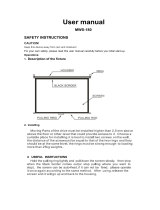
Distributed in Canada by
Yorkville Sound Ltd., 550 Granite Court, Pickering, Ontario L1W-3Y8
phone : (905) 837-8481 fax : (905) 839-5776
www.apexelectronics.com
Distributed in U.S.A. by Yorkville Sound Inc., 4625 Witmer Industrial Estate Niagara Falls, New York, 14305
phone : (716) 297-2920 fax : (716) 297-3689
Apex440 USB Wide Diaphragm Condenser Microphone
Apex440 USB Wide Diaphragm USB Condenser Microphone
The Apex440 is a Class-A FET condenser USB microphone designed to
direct connect to any USB 2.0 equipped computer or laptop. The 35mm
gold sputtered/center-terminated wide diaphragm capsule delivers a full
20Hz to 20kHz frequency response, rivaling standard studio condenser
microphones.
The Apex440 offers the added convenience of an internal 24bit / 96kHz
digital conversion direct to the USB2.0 output, making it the ideal micro-
phone for software based recording solutions or Podcasting. The Apex440
operates on both Windows and Mac platforms.
A -10dB pad switch allows miking of high SPL sources without overloading
the mic's electronics, and an 80Hz Low Frequency Roll-off filter can be
engaged to reduce rumble and increase a recorded source track's intelligi-
bility in a final mix.
Features:
Class-A FET Cardioid Condenser Microphone with USB Output
Plugs in directly to any USB equipped computer running Mac OS-X
or WindowsXP
Perfect microphone for Podcasters, broadcast applications, ENG
and music applications
Cardioid pickup pattern
35mm gold sputtered Diaphragm
-10dB pad & 80Hz Low Frequency roll-off switches
24Bit / 96kHz A to D ConverterUSB connection cable included
Installation and Operation
Installing the Apex440 is a simple procedure. Since the Apex440 is USB com-
pliant, you can use either a Mac running OS-X or any PC running
WindowsXP or later. Simply connect the microphone to a standard USB port
using the included USB cable and plug and play. You will be able to control
your Apex440 using the standard audio interface controls in the Mac OS or
Windows operating system.
Since it is possible to adjust the level of the signal from the operating system
preferences, and in your recording software, it's a good idea to be familiar with
these controls in the Mac or Windows operating system. Therefore, we recom-
mend that you follow the enclosed instructions for either Windows XP or Mac
OS-X before installing the Apex440 software driver.
Setting up the APEX181 in MAC OS X
Plug in microphone. The LED will light to indicate it is receiving USB
power. The Mac will recognize the USB audio device and automatically
install a universal driver.
To select the Apex440 as the computers audio input, open the System
Preferences from the dock or the main Apple Menu
Next open the Sound preference
Now, click in the Input tab and select USBMIC
Setting up the APEX181 in Windows XP
(with Service Pack 2 - other versions may vary slightly.)
Plug in microphone. The LED will light to indicate it is receiving USB
power. WindowsXP will recognize the USB audio device and automatical-
ly install the universal drivers
The Apex440 is now recognized as a Windows audio device under the
name USBMIC. To set it as the default device and change computer-con-
trolled gain, access control panel.
Access Sounds and Audio Devices through Control Panel. Select USB-
MIC as Sound recording device in the Audio tab window. You may also
have to select the microphone in most pro audio programs where multiple
devices must be set within the program.
To set the microphone Gain, click the Volume button. The Wave In win-
dow sets the computer controlled gain, pan and microphone mute.
Powering the APEX440
The Apex440 is a condenser microphone, and like all condenser micro-
phones, it has internal electronics that require an active power supply.
Traditional studio condensers are almost always powered by a Phantom
Power supply, from a mixing console or external pre-amp. The Apex440
receives its power from the USB bus. Simply connect the microphone to
the computer's USB port and the microphone is ready to operate. The
Apex440 features a blue power LED, which will illuminate when USB
power is present.
Microphone Placement
A cardioid polar pattern like that used in the Apex440 is generally the stan-
dard for most applications. A cardioid pattern will deliver best results on
most vocal recordings and on a wide range of solo instruments. It offers full
frequency response on the front of the microphone and the advantage of
proximity effect (increased low frequency response when microphone is
placed close to sound source*). A cardioid pattern also provides excellent
noise rejection from the sides and back, or 180-degree position of the
microphone, minimizing feedback and interference from other audio
sources.
*Vocalists can use the proximity effect to their advantage, adding fullness
and more 'bottom end' to the voice as they move closer to the microphone.
Experienced vocalists can easily incorporate it as part of their overall
microphone technique. Experimentation with mic placement during the
recording process is the key.
It may be advised that in some applications that a pop filter like the Apex
MWS-55 or Apex MWS-56dlx be employed to reduce overly prominent "P"
and "B" sounds.
Low Frequency Roll-Off Switch - The 80Hz Low Frequency Roll-off filter is
used to reduce low frequency interference, boominess or rumble which will
increase intelligibility of your recorded track in a mix.
-10dB Pad Switch - The -10dB pad switch allows miking of high SPL
sources without overloading the mic's electronics or the input of your com-
puter and recording software.
Type: Wide Diaphragm FET Condenser w/ USB
Polar Pattern: Cardioid
Capsule: 35mm Gold Spluttered
Frequency response: 20 Hz to 20 kHz
Sensitivity: -40dB
S/N Ratio: 75dB (for 1pA)
Max SPL: 137 dB
Power Requirement: USB low-power device (26 mA)
Resolution: 24bit / 96kHz
Controls: -10dB pad / 80Hz low Frequency Roll-off
Connection: USB
Dimensions (in): 7.5 (L) x 1.875 (dia)
Dimensions (mm): 190 (L) x 40 (dia)
Weight (oz/g): 17 / 464
Apex440 Specifications:
Page is loading ...
/

